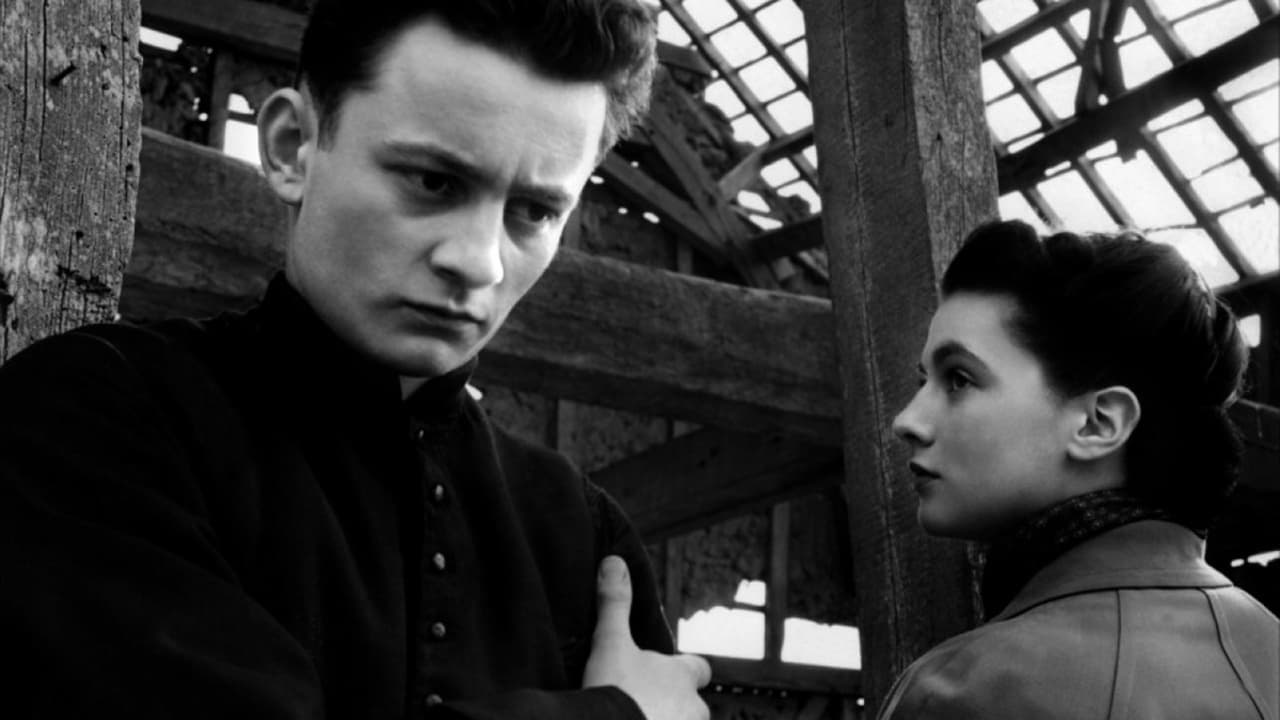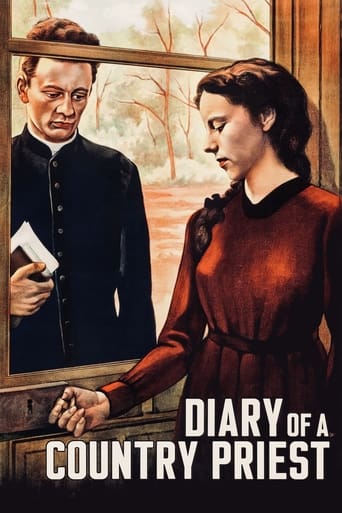

This is not a movie. It's God itself in every frame from beginning to end. Bresson did the impossible. To "see it", it takes the eyes of the heart and the light within us.In cinema there are 3 things:1- Bresson: He is everything and above all things; "He" is like Fight Club, you don't talk about it.2 - The best movie ever made: Reservoir Dogs.3 - The Only Movie that exists: Blade Runner.Please, talk about the "normal" movies and choose this and that and say "Wow". Thank You.
... View MoreThis one is one of the most novelistic films I've ever seen. I haven't read the source material, yet, but I feel that it's been adapted almost word-by-word. Even the scenery, the landscapes, the interiors, the characters' faces appear to be like pictures, imaginations you have in your mind when you read a novel and experience the story through the subjectivity of the main protagonist - dreamlike, mysterious, vague, greyish, dark, incomprehensible. Every scene in the film shows a moment in the life of the young, idealistic priest as a depiction of his being, his disease, his questions and his silence. These bits and facets slowly come together for the viewer - just as for the protagonist himself. The last shot of the cross is the summary and the extension of the film: grey, hazy, crooked, almost without contours it is not a sign of victory and redemption, but a remembrance of the endlessness of the grey landscapes, the dark buildings, the incomprehensible gestures, recalling the suffering and immense loneliness of the priest. It recapitulates his pain and is a sign of torment. Now that I've seen one film by Bresson made before this one and several made after this week, Journal is a transition in the filmography and contains seeds of almost every moment in Bressons later works, especially the typical Bressonian techniques of sound editing, and, of course, the unique monotony and brilliant coherence of the images.
... View MoreRobert Bresson's 1950 breakthrough film, Diary Of A Country Priest (Journal D'Un Cure De Campagne), is one of those films that is absolutely antithetical to everything a Hollywood film stands for. It is obsessive, detailed, slow, and opaque. This, however, does not mean it is a great film, as so many knee-jerk critics claim it is. It is not; but it is a very interesting film. Ostensibly, it may seem to be a film on religion and/or suffering, or, as film critic Fréderic Bonnard claims, in The Criterion Collection's DVD essay on the film, a film 'about imprisonment,' but it's neither, really. It's more cogently a film about masochism, guilt, and pathological privation, although it does touch upon religion, suffering, and imprisonment. The film was not only directed by Bresson (his fourth of thirteen films), but also adapted by Bresson from the 1936 novel of the same title by Georges Bernanos. Anyone familiar with the works of Carl Theodor Dreyer will be familiar with the techniques used by Bresson- although this film is less stagey and more intimate in tone, but Bresson's cinematographer, Léonce-Henry Burel, is not as slow and deliberate as Dreyer, nor does the film depend so heavily on the juxtaposition between light and dark as Dreyer's works do. There is a 'lightness' in Bresson's film that is absent from Dreyer's- both in terms of the gauzey and diffused visuals and intellect. This is not to say that Bresson's film lacks depth, it's merely not as dependent upon a grand philosophical posit as Dreyer's films are . Yet, the film never reaches the heights that other religiously meditative films, such as Ingmar Bergman's Winter Light, do, mostly because of the very blandness of the narrative. Whereas Bergman's film transcends religion and cores into universal human behavior, Diary Of A Country Priest merely presents its simple narrative, and if one cannot get into it- for its religious-specific ideas, so be it. Also, the film never gets truly inside the young priest. Why, for example, does he even keep a diary? All it seems to be is a book filled with gossip and his petty and self-serving observations. Yet, the film likens the priest to a Christ-like character, rather than a mere outcast. Since outcasts are universal, why does Bresson decide to affiliate the lead character with the remote Christ and not the ubiquitous nebbish? After all, the priest has no name, and this is clearly done to universalize him, even though a priest, by definition, is a non-universal figure. Not that a Christ complex could not be compelling on screen, just that this particular one is not, for all this character can muster are vapid apothegms such as, 'The desire to pray is already prayer,' "I was a victim of the Holy Agony,' or his dying words, as related by Dufréty: 'What does it matter? Everything is grace.'Were only those words true this film would recapitulate their meaning. Failing that, it at least tries, something that, again, Hollywood films do not even dare. Perhaps that young priest was on to something?
... View MoreI kind of feel like a genius; I feel like I'm the only one who saw through this fake film. I watched it three times, once with commentary, and I found myself getting annoyed at all the close-ups, all the times the screen just blacks out, and worst of all, I feel the film never really resolves anything. Yes, the priest dies, but he didn't really seem at peace with the town that gave him so much grief, or with himself. That and he was an idiot. If it weren't for the commentary by Peter Cowie which explained not only the movie but the book it came from, I wouldn't have been able to stomach it at all. I enjoy French movies, but this is one that was completely absurd.Diary of a Country Priest is filmed in beautiful black and white photography but, that alone cannot save this deadly dull tripe. Scene after scene of extreme close-ups where characters don't say anything until the camera cuts away and goes to a black out do NOT make an interesting or relevant story. How this film ever became a classic is mind boggling: it reminds me more of The Emperor's New Clothes.Yes, Claude Laydu's performance is heartfelt and thought provoking, if you are a sadist, but this film left me feeling empty because overall it is a weak impression of the Catholic priesthood, which is an ignoble and inglorious institution of corruption. The young priest's triumph over the countess's pride is a weak scene but 90% of the film will drag you down with its dreary introspection and window into the young priest's melancholy thoughts. This priest doesn't come across so much as being humble as he does just plain pitiful.Being that I don't speak or understand French I was looking forward to doing the English SUBTITLE thing to help understand the film. Well, the English SUBTITLE is at times impossible to view/read and the text rolls by so quickly that there was much I could not read (and I am not a particularly slow reader - I just finished Dostoyevsky in 3 days). I really wanted to like this film . I try out everything "chosen" by the Criterion Collection, and yet can not see why in many ways this one merits some sort of critical nod. However, I sat through this entire two hour film yearning to feel some sort of empathy for the main character, and it never materialized. He just seemed like a victim rather than a fighter. And for that, I say it stunk.
... View More